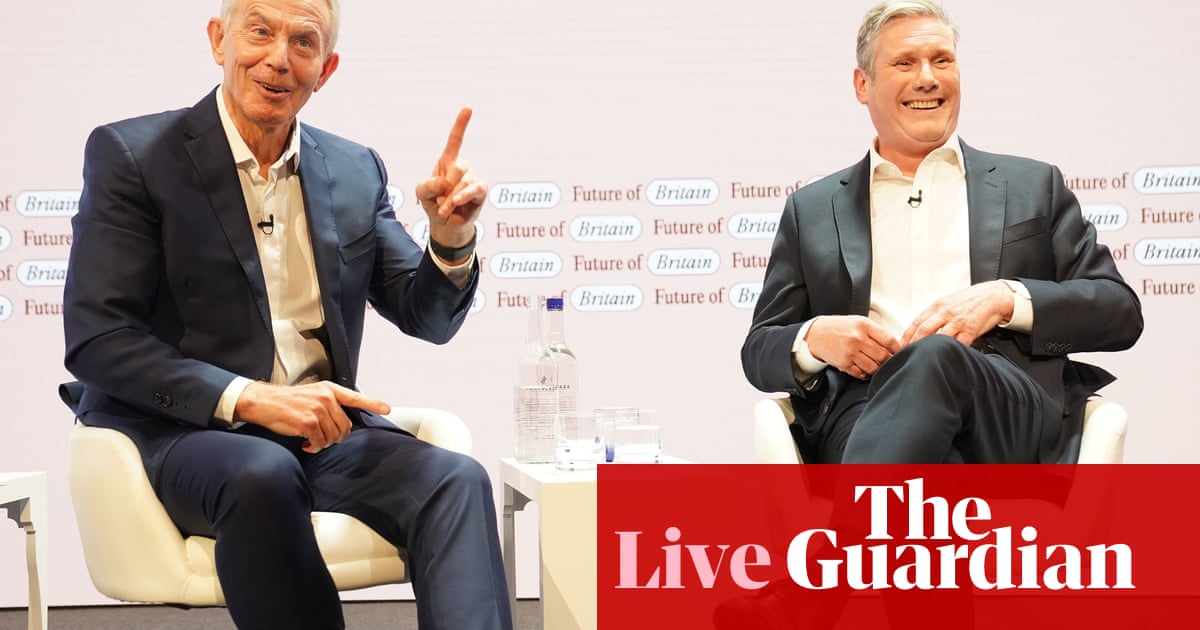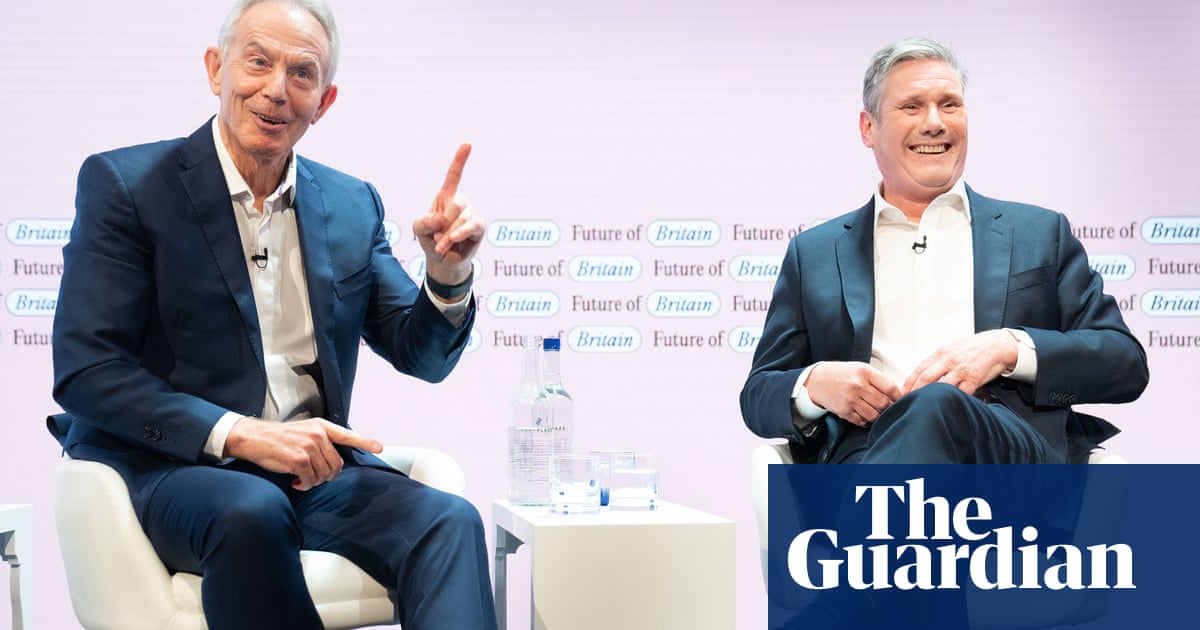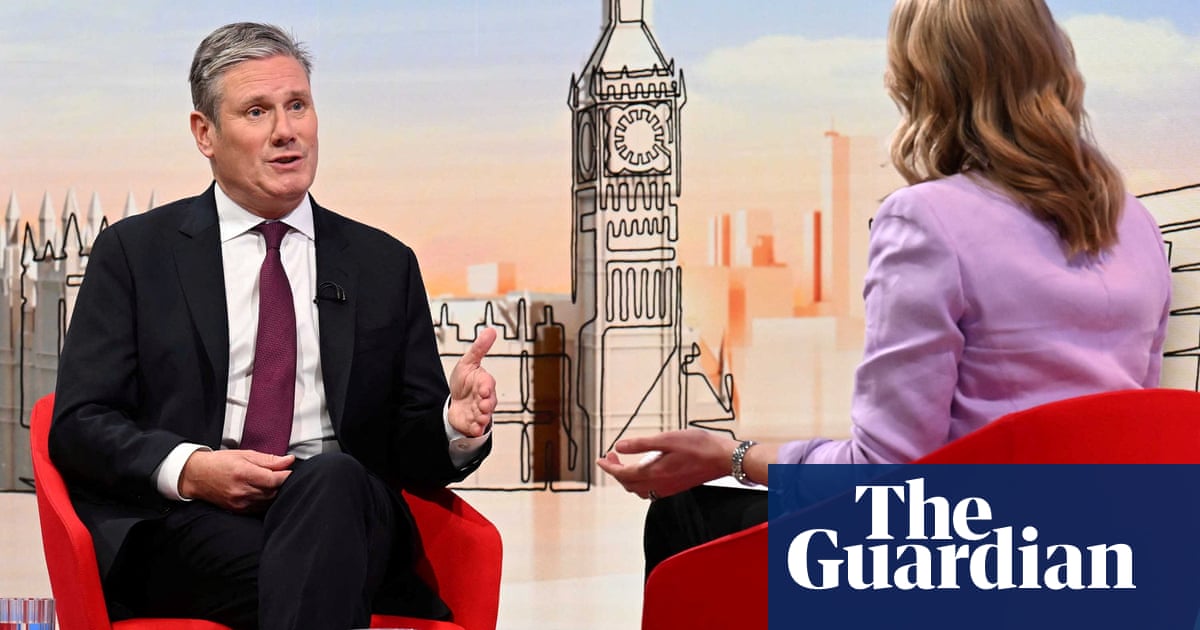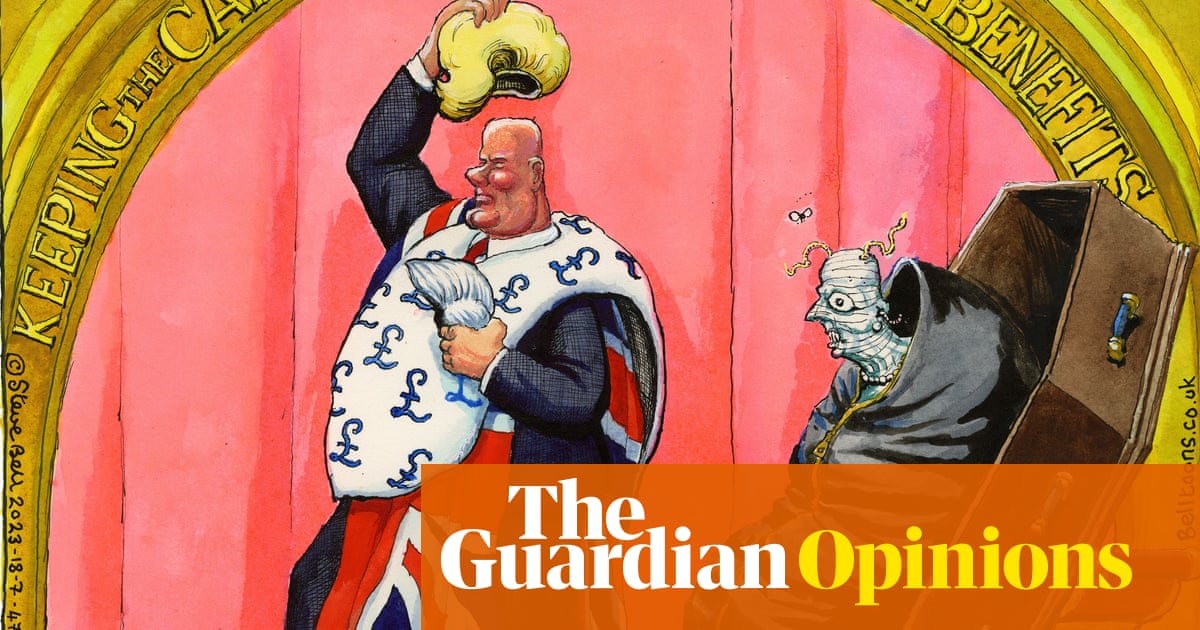
Starmer suggests two-child benefit cap row is example of what taking "tough choices" involves
Starmer says they are having a row about “tough choices” at the moment. That is because they need economic discipline.
He says people agree in abstract that the party has to take tough decisions. But, as soon as you take one, they ask for an exception, he says.
He does not mention directly the two-child benefit cap, but that he is referring to.
He says Liz Truss provided an example of what happens when a government embarks on irresponsible spending. He says he won’t let his government go anywhere near the equivalent of what Truss did.
Afternoon summary
Keir Starmer has defended his decision to say that Labour will keep the two-child benefit cap because it needs to show its commitment to fiscal responsibility. Speaking in a Q&A with Tony Blair, Starmer suggested it was no good talking about being willing to take “tough decisions” in the abstract if he was not willing to take them in particular cases. Referring to the dispute, he said:
My first reaction is we keep saying collectively as a party that we have to make tough decisions. And in the abstract, everyone says: ‘That’s right Keir.’
But then we get into the tough decision; we’ve been in one of those for the last few days, and they say: ‘We don’t like that, can we just not make that one, I’m sure there is another tough decision somewhere else we can make.’ But we have to take the tough decisions.
Starmer was speaking after Jeremy Corbyn claimed Labour MPs were “seething with anger” over the decision. In comments to the shadow cabinet earlier, Starmer said working people would suffer if a Labour government lost control of the economy. (See 5.29pm.)
Rishi Sunak’s migration bill “will have profound consequences for people in need of international protection”, a UN body has warned, as protesters greeted the arrival of the first barge that will house asylum seekers under government plans.
Labour mayors are launching legal action to prevent the closure of railway station ticket offices across England.
The Blair/Starmer Q&A was fascinating for anyone interested in Labour politics. They did not disagree on much, but to describe it as a love-in does not quite capture the uneasy hierarchy jostling that was going on. Blair is the most successful Labour election winner in the past half century, and he does not defer to others lightly. But, talking to Starmer, he was treating him with a level of respect he normally reserves for a US president. As Robert Shrimsley from the FT, and Tom McTague from the Atlantic suggest, it was quite a moment.
Patrick Maguire from the Times has been briefed on what Keir Starmer told the shadow cabinet about the two-child benefit cap row. Stressing the importance of fiscal discipline, Starmer said:
It doesn’t matter if it’s unfunded tax cuts or unfunded commitments – it’s working people who suffer.
(This probably functions better as a soundbite than as a statement of economic reality.)
Starmer also said he would “not let an incoming Labour government lose control of the economy because I know what it will do to working people”.
(That’s a more realistic economic proposition, although his critics would say reversing a benefit cut at a cost of £1.3bn isn’t the same as losing control of the economy.)
Starmer says Labour will need to be "even tougher, even more focused, even more disciplined" as election approaches
Blair says, as Labour leader, you are always “in receipt of an inexhaustible supply of advice on how to lose” (ie, bad advice).
And he says, that when he became leader, he was lucky enough to follow Neil Kinnock and John Smith. Starmer wasn’t, he said.
Starmer accepts he had to do what Kinnock, Smith and Blair did all in one go. It led to him acting “at speed”, he says.
And he says he felt Labour did not have the right to tell people how it would run the country until it had shown it had changed.
Starmer says he has done that. And he has shown what the government is doing wrong. Now is the time to set out what he would change.
He says people wanted him to do this in a different order. That would not have worked, he argues. He goes on:
If we hadn’t changed the Labour party, then they’d be looking at us and saying: ‘Nah, we’re not going to do that.’
He says in the next phase Labour will need to be “even tougher, even more focused, even more disciplined” as the election approaches.
Blair ends by saying:
If how far you’ve taken the Labour party in the last four years is any guide to how far you can take the country, we’ll be in the good hands.
Blair says that, in progressive politics, there is a tendency to judge effectiveness by how much money is being spent.
Starmer agrees. As head of the Crown Prosecution Service, he saw the importance of reform, as well as spending, he says.
As an example, he recalls going to Wales, where documents for court appearances were all transferred on paper, not electronically.
Blair asks about health. Starmer says, with AI, cancer diagnosis will improve significantly.
Blair made that point himself in his speech earlier. (See 4.10am.)
Starmer says at the moment “go to the GP or go to A&E” are broadly the only options available for people in health. He says services should be closer to people, so that people have more choices.
Starmer is now talking about energy policy.
He says he asked an energy boss how long it would take to build and set up a new windfarm. He was told 13 years, with five years wasted because of planning constraints, and more time wasted getting connected to the grid.
Starmer suggests a Labour government would change planning laws to speed this up drastically.
And he says this is why his missions are so important. They mean that, if he wins the election, he will have a mandate to implement all the reforms the missions require. That is because he will be able to say it is what people voted for.
Starmer suggests two-child benefit cap row is example of what taking "tough choices" involves
Starmer says they are having a row about “tough choices” at the moment. That is because they need economic discipline.
He says people agree in abstract that the party has to take tough decisions. But, as soon as you take one, they ask for an exception, he says.
He does not mention directly the two-child benefit cap, but that he is referring to.
He says Liz Truss provided an example of what happens when a government embarks on irresponsible spending. He says he won’t let his government go anywhere near the equivalent of what Truss did.
Blair tells Starmer he has done an amazing job. He says there is a “pretty good prospect” for the next election.
He says he is a fan of Starmer’s missions, because they set a direction for the government. He says, if Starmer becomes PM next year, he will be the sixth PM in eight years.
Starmer agrees. He says at Davos international business figures were saying they would not invest in the UK because they did not have certainty.
Starmer and Blair are now engaged in conversation.
They start by joking about PMQs. How’s it going, Blair asks. Starmer says that he is out of practice, because Rishi Sunak has missed the last two.
Starmer says, unlike Blair, he believes that only progressives can answer the challenges of future
Starmer says he does disagree with Blair on one thing.
He says he does not accept the idea that the challenges facing the world are a matter beyond left and right.
Starmer says only progressives can face the challenges of the future. “On the right, all I see is retreat,” he says.
UPDATE: Starmer said:
Finally, one place where I do take issue with Tony – the idea that this is somehow beyond left and right.
For me, this is a progressive moment, because on the right, all I see is retreat, retreat from the world, retreat from the battle of ideas, retreat from the necessary fight against their dangerous fringe.
On the other, all around the world I see progressive parties asking the difficult questions, looking for new ways to express that traditional argument, going for growth.
That, in the end, is the only way to break Britain out of its current doom-loop and deliver our purpose.
Starmer says Labour loses when it forgets the importance of security and aspiration.
There are other directions a progressive party could take, he says. There is the “rabbit hole of narrow identity politics”, he says. And, after Brexit, some on the left wanted to give up on the concerns of working people.
UPDATE: Starmer said:
And for my Labour party, for me, after the collapse in Scotland in 2015, the loss of the red wall in 2019, and the division of the Brexit years, the project is to return Labour to the service of working people. To become, once again, the natural vehicle for their hopes and aspirations across all four nations on these islands.
It’s not the only path a progressive party could take, there are always different directions. The rabbit hole of narrow identity politics is not a new thing, but it’s always there.
You could even completely unmoor from the concerns of working people, that sounds ridiculous to me, but some people did seriously suggest it, after the Brexit referendum.
But no, I am completely convinced that reconnecting with working people is the right path. Not just because I feel it in my bones, although I do, but also because it forces us to confront the realities of the country and its challenges more starkly.
"Growth, growth, growth" - Starmer tells Blair"s conference what UK needs most
Starmer’s speech is billed as quite a short one, and he is running through some stock themes.
He says he wants to shatter the class ceiling that holds people back in this country.
He says the country faces mulitple challenges. But he sums it up like this.
We need three things: growth, growth, growth.
It is a reference to Tony Blair’s famous quote about his three priorities being “education, education, education”, and he tells the audience they’ve heard something like this before.
UPDATE: Starmer said:
Make no mistake, it’s a new age of insecurity and we’re not even close to match fit.
So - to get back on our feet, join the race, win the race, and get our future back.
We need three things:
Growth.
Growth.
Growth.
You might have heard a refrain a bit like that before. But I’m serious, it’s the only answer that can restore long-term hope and opportunity.
Starmer thanks Blair for his support as he addresses conference run by former PM"s thinktank
Keir Starmer is speaking now to the Tony Blair Institute conference.
He starts by thanking Blair for the invitation, and “for all the support that you have given me since I’ve been Labour leader”.
And he also praises the policy work done by the thinktank.
He says he likes the fact that the institute has “a fierce commitment to this country” and a firm belief life can be better.
(In normal circumstances, one party leader paying tribute to a predecessor would not be worthy of note, but Starmer’s predecessor as leader viewed Blair as a war criminal, and even in the Ed Miliband era Blair’s endorsement was seen as more of a liability than a blessing.)
SNP MP Philippa Whitford to stand down at next election
The SNP’s Dr Philippa Whitford has announced she is stepping down at the next general election, becoming the party’s eighth MP to do so, PA Media reports. PA says:
The Central Ayrshire MP, who has been at Westminster for eight years, has said she will not contest her seat.
It comes after seven other SNP MPs, including the party’s deputy Westminster leader Mhairi Black, made similar announcements.
Whitford is the group’s spokeswoman for Scotland and before entering Westminster she worked as a breast cancer surgeon.
There are currently 44 SNP MPs at Westminster, and Whitford’s announcement means that almost a fifth of the parliamentary party (18%) is standing down. This is an even higher proportion than in the Conservative party, where the 42 MPs who have said they are standing down comprise 12% of the parliamentary party.
In some cases motives might be similar, because both parties will struggle to hold seats at the next election. But English MPs tend to be people who have had a lifelong ambition to make it to Westminster, whereas SNP politicians are people who aspire to ensure that Scots never need to sit in the Commons ever again.
Blair says mastering technological advances, including AI, key challenge for progressive politics in 21st century
Tony Blair delivered his own speech to his thinktank’s conference this morning. He said the key task for progressive politics in the 21st century was mastering technological advances, such as artificial intelligence. He said:
This technology revolution isn’t an interesting sideshow on the margins of traditional politics.
It should change them as completely as it is changing the world.
Of course like every technology there are dangers … which are also huge.
But in political terms – small ‘p’ political terms – it goes to the same point.
Understanding, mastering and harnessing the 21st-century technology revolution is the 21st-century’s progressive political mission, in the same way that ultimately mastering the 19th-century Industrial Revolution became the mission first of the Liberal party in the 19th century and then the Labour party over 100 years ago.
Otherwise, for progressive politics the danger is in retreat to a version of old-fashioned state intervention which now manifests itself in anti-globalisation sentiment, forgetting the enormous benefits open trading markets have brought the world.
Or in new-fashioned identity politics, which risks mirroring the divisiveness of the far right, not defeating it.
As PA Media reports, Blair said neither government nor health services were making use of national data infrastructure while digital IDs, which he said were “preconditional for a completely digital state”, were not being created.
Giving examples of the potential change possible, he said “proper use of NHS data” could save £10bn a year in early targeting of illnesses and that real-time data could help reduce hospital admissions by 60%.
Keir Starmer will shortly be giving a speech at the Future of Britain conference organised by the Tony Blair Institute. He will then take part in a Q&A with Blair himself.
Ben Wallace, the defence secretary, was at the conference earlier. Interviewed by the broadcaster Jon Sopel, he said that his decision to leave the cabinet, and stand down from the Commons, was not a reaction to the fact that he did not get appointed as the next Nato secretary general.
He said he never set out to be the next Nato secretary general. Until earlier this year it was assumed that Mark Rutte, the Dutch prime minister, would get the job, he said. When Rutte ruled himself out, Wallace said at that point he became interested. But he said he thought he missed out because the Americans wanted a former head of government to fill the role.
Ben Wallace, the defence secretary, has now published the defence command paper. Announcing it in the Commons, he said there were no PR-driven “shiny” announcements in it. He said:
As Russia has so effectively proven, there is no point having parade ground armies, mass ranks of men and machines if they cannot be integrated as a single full spectrum force, sustain in the field under all demands of modern war fighting.
That takes professional forces, well-equipped and rapidly adaptable, supported by critical enablers and vast stockpiles of munitions.
And that is why, in this document, you won’t find shiny new announcement, comms-led policy driving unsustainable force designs.
Here is Dan Sabbagh’s story about what’s in it.
People who died with Covid were treated like “toxic waste”, bereaved families have told the UK Covid-19 public inquiry, as they expressed their determination to channel their “grief, frustration and heartbreak” into making the UK better prepared for future pandemics. Robert Booth has the story here.












